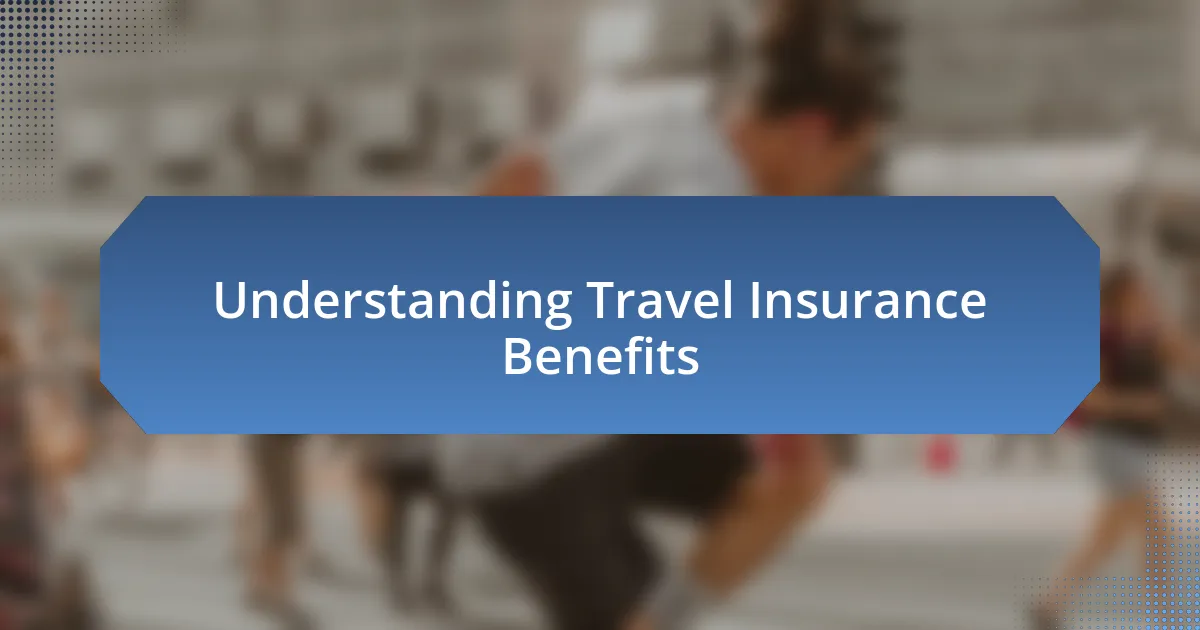Key takeaways:
- Travel insurance provides essential benefits like medical coverage, trip cancellation reimbursement, and peace of mind during unexpected events.
- Different types of plans, including comprehensive, emergency medical, and adventure travel insurance, cater to various travel needs and activities.
- It is crucial to evaluate policy coverage, including understanding exclusions, coverage limits, and the claims process to avoid surprises during emergencies.
- Common exclusions in travel insurance, such as pre-existing conditions and risky behavior, can lead to significant financial burdens if not understood upfront.

Understanding Travel Insurance Benefits
Travel insurance benefits can often be a safety net during your adventures. I remember a time when my flight got canceled unexpectedly. It felt like a nightmare—until I realized I had travel insurance that covered the extra accommodation costs. This kind of peace of mind is invaluable when things go awry.
One of the most important benefits is medical coverage while you’re away. Have you ever thought about what might happen if an accident occurred in a foreign country? I once sprained my ankle during a hiking trip abroad. Thanks to my insurance, I didn’t have to stress about exorbitant medical bills while trying to focus on recovery.
Trip cancellation can be another significant relief. Imagine planning a long-awaited vacation, only to have to cancel due to an emergency. I once had to back out of a trip last minute, but because of travel insurance, I was reimbursed for my non-refundable expenses. It’s moments like these that truly highlight the worth of having a solid travel insurance policy in place.

Types of Travel Insurance Plans
When considering travel insurance, it’s essential to understand the various plans available. Each one offers coverage tailored to different needs and situations. For instance, comprehensive plans combine medical, trip cancellation, and baggage protection. I had a travel companion who opted for this type of plan, and when a sudden illness struck her right before our trip, she was grateful to have the cancellation coverage in place.
Another common option is emergency medical coverage, which focuses primarily on medical expenses incurred overseas. I once traveled to a remote area where medical facilities were limited. Having emergency medical coverage meant that I could seek treatment without worrying about the financial burden. It’s a relief to know that you can receive the care you need without incurring a mountain of debt.
Lastly, there are specialized plans such as adventure travel insurance. If you’re planning activities like scuba diving or skiing, this coverage is indispensable. I recall a snowboarding trip where one of my friends experienced a minor injury. His specialized plan not only covered his medical bills but also provided for his equipment loss. It’s tailored coverage like this that can make or break your travel experience.
| Type of Plan | Description |
|---|---|
| Comprehensive Plan | Covers medical, trip cancellation, and baggage protection. |
| Emergency Medical Coverage | Focuses solely on medical expenses while traveling. |
| Adventure Travel Insurance | Specialized for high-risk activities like skiing or scuba diving. |

Evaluating Insurance Policy Coverage
When evaluating your travel insurance policy coverage, it’s crucial to dive into the specifics of what’s included and excluded. I remember a trip I booked that promised breathtaking views and unforgettable experiences, but I overlooked checking the fine print of my insurance policy. It turned out that my plan didn’t cover certain types of trip interruptions, which could have left me vulnerable if unexpected events arose.
Here are some key points to consider when assessing your policy:
- Coverage Limits: Understand the maximum amount your insurance will pay for various claims.
- Exclusions: Identify what is not covered, such as pre-existing conditions or specific activities.
- Network Providers: Check if you’ll need to use certain hospitals or services to get full coverage.
- Claim Process: Familiarize yourself with how to file a claim and the documentation required.
- 24/7 Support: Ensure that you have access to assistance anytime during your trip.
A thorough evaluation can help avoid unwelcome surprises when you need your insurance the most.

Important Factors to Consider
When considering travel insurance, one important factor that often goes unnoticed is the deductible. I recall a scenario where I had to pay a hefty deductible before my insurance kicked in during a minor accident while abroad. This led me to wonder, what if I’d suffered a more serious issue? Understanding how much you’ll need to pay out-of-pocket is essential for planning your finances during emergencies.
Another aspect to weigh in is the type of coverage that aligns with your travel activities. For instance, if you’re an adventure seeker planning to go scuba diving or rock climbing, you must ensure these activities are covered. I once signed up for a thrilling excursion without realizing my insurance plan excluded high-risk sports. It made me realize that having the right coverage isn’t just about safety, but also about peace of mind while you’re chasing adventures.
Lastly, I highly recommend looking into whether your plan offers any trip cancellation coverage. Have you ever had to cancel a trip last minute due to unforeseen circumstances? It’s both frustrating and costly. I once lost money on a prepaid hotel stay because my policy didn’t cover cancellations for personal reasons. Knowing how cancellation works in your insurance can save you from significant heartbreak and financial loss if plans change unexpectedly.

Common Exclusions in Policies
It’s important to understand that many travel insurance policies come with exclusions that can catch travelers off guard. For instance, I remember booking a vacation during peak hurricane season, only to find that natural disasters were excluded from my policy. I felt a wave of anxiety when I realized that if a storm caused my trip to be disrupted, I wouldn’t have any coverage at all. This experience really highlighted for me the importance of reading the fine print.
Another common exclusion I’ve encountered is related to pre-existing medical conditions. After dealing with a chronic issue, I made the mistake of assuming my travel insurance would cover related complications during my trip. However, when I needed care abroad and learned my condition was deemed a pre-existing condition, it felt like a punch in the gut. Could you imagine being in a foreign country and discovering you’re responsible for all medical expenses? That realization can be incredibly disheartening.
Lastly, I’ve noticed that some policies also exclude certain types of incidents, such as those occurring while under the influence of alcohol or drugs. I once attended a lively celebration while traveling, indulging a bit too freely. Thankfully, nothing went wrong, but the thought that any mishap could have rendered my insurance void was a little unsettling. It’s crucial to be aware that your behavior can influence coverage, and engaging in risky behavior can leave you financially vulnerable.


